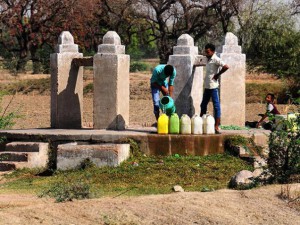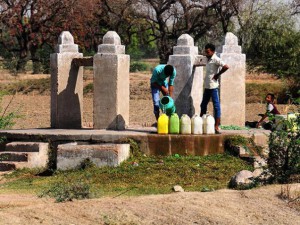No water, no weddings in parched Bundelkhan

 BUNDELKHAND: A tumbler tucked under her armpit, Bhuri trudged along the dusty broken path to the “Pahadi wali Ma ka Mandir.” The exhaustion on the 48-year-old Kumhar woman’s face was apparent as she approached the hill in the blazing sun.
BUNDELKHAND: A tumbler tucked under her armpit, Bhuri trudged along the dusty broken path to the “Pahadi wali Ma ka Mandir.” The exhaustion on the 48-year-old Kumhar woman’s face was apparent as she approached the hill in the blazing sun.
But the hill hosts more than a goddess — the well at its foot is the only natural supply of potable water for the village of Kapsa. The catch — it is two km from the village, a long distance to walk for a glass of drinking water, especially in scorching temperatures. For Bhuri, that can mean a journey to the hill multiple times a day.
“My parents decided my marriage. Had I known I would be fated to this, I would have never got married in this village,” Bhuri said. “Which woman would like to spend the rest of her life fetching water like this?” she asked.
Bhuri’s regret is borne out of experience but there is also an element of anxiety as her three sons have found it difficult to find brides.While caste, class and religion are routine factors in any arranged marriage, proximity to the nearest well in the groom’s village has become a crucial element in deciding nuptials in drought-hit Bundelkhand.
In Kapsa, successive droughts and a perpetual water scarcity have made it difficult for men to find brides. As is traditional, the girls of the village have moved out after marriage but families from other villages are not willing to send their daughters to this village in Maudaha tehsil of Hamirpur, fearing they would be stuck fetching water from far away for the rest of their lives.
Critical situation
As 50 districts of Uttar Pradesh reel under severe drought, the situation in Kapsa is critical. The village has no tube well or canal close by. Its five ponds have all dried up, and of the 20 hand pumps, only seven are functional but high salinity makes this water non-potable. The only relief has come from two water tankers that supply a limited quantity of water at intervals.
“Fathers of the girls usually ask me, ‘When you or your sons are not in the village, how will my daughter cope? Will she do this for the rest of her life?’ I have no answer to give,” said Ranvijay Singh, who is finding it difficult to get his two younger sons married
“On many occasions, people have visited to see my boys. My boys are decent-looking and tall, and the girls’ families liked them. But once they sense the water situation, they do not return or call back,” said Mr. Singh.
After much difficulty, he got his eldest son Bharat married in 2012. Now, Mr. Singh faces the “gargantuan task” of getting his two younger sons married. All three sons work as security guards in Gujarat.With 1,530 inhabitants, Kapsa’s population mainly comprises upper caste Thakurs, Yadavs, Dalits and Pals.
A paltry 51 per cent are literate and most residents are depended on agriculture as farmers or farm labourers. If its water scarcity has deterred women from marrying into the village, over the years, scores of young men, like Mr. Singh’s sons, have been forced to migrate to work in brick kilns and construction sites as manual labour. Inter-region migration is also reported.
The recent drought has triggered a fresh bout of migration from the village.
As one walks around the Dalit corners of the village, one can see houses that are locked or with no male members — in some cases, entire families have fled the crisis.
One of the houses belongs to a Jatav, Brij Lal, who migrated to New Delhi a month ago to escape the blight. His neighbour Manni, whose husband already works in Noida, plans to follow in the next few days. Her son, an electrician, faces a similar quandary as the rest of bachelors in the village. “Will we save our lives or arrange marriages?” Manni asked.
The present severe drought has meant that marriages have been cancelled, scaled down or postponed across Bundelkhand. For Kapsa however, the problem is a perpetual one, earning it an infamy it is finding hard to shed. Pradhan Chandrabhan Singh is concerned. “Yes, people think twice before giving their daughters in marriage. The truth is that even the most prosperous among us have gone to the well at least once,” he said.
To mitigate the water scarcity, the Samajwadi Party government has allocated funds for tankers and installation of new hand pumps. But pradhan Chandrabhan Singh feels that would not be enough to solve Kapsa’s long-term crisis.
“It is for the first time in two decades that tankers have entered the village. But what about the permanent solution? I have written to the administration to dig bores at four sites, for which I am willing to provide land. But they have not even responded,” Mr. Singh complained.
When Kapsa’s case was brought to the attention of Chitrakoot Divisional Commissioner Venkateshwarlu, he said he would inspect the condition in the village.(Hindu)

